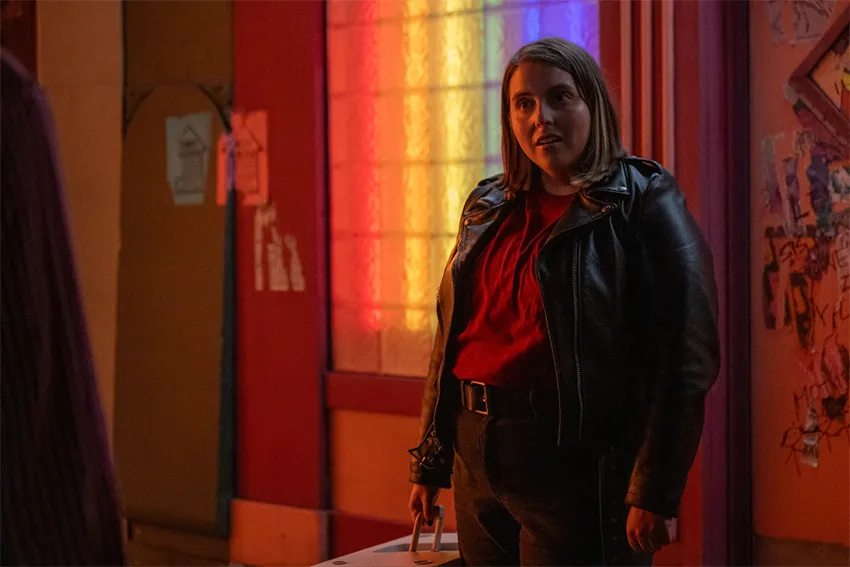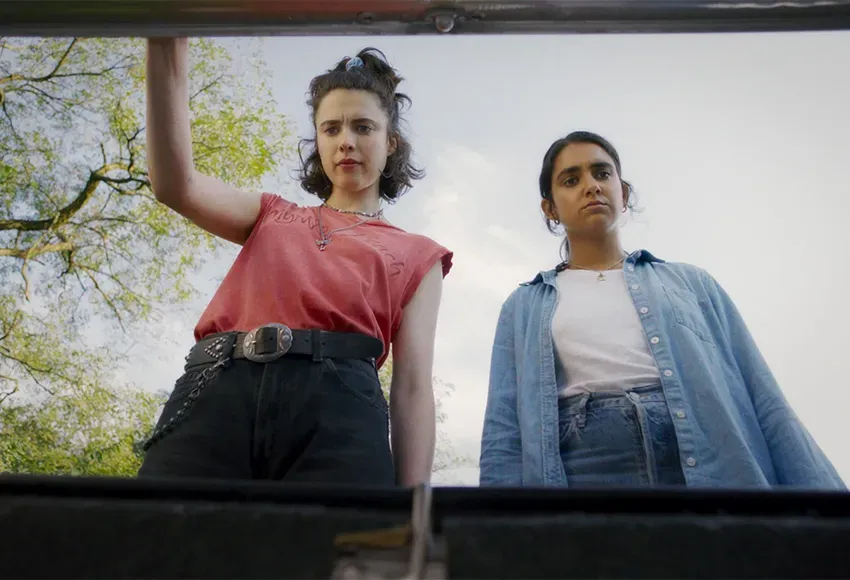DRIVE-AWAY DOLLS
Theaters
Like many young filmmakers in the 1970s, Jonathan Demme got his start working with Roger Corman on a string of low-budget exploitation endeavors, most notably the mother of all "women in prison" flicks, 1974's Caged Heat. In the 1960s and '70s, Russ Meyer burst upon the scene with a string of sensationalistic, female-driven concoctions, including all-timers like 1965's Faster, Pussycat! Kill! Kill! And 1970's Beyond the Valley of the Dolls (written by Roger Ebert, no less). And don't get me started on Doris Wishman. Her crazed filmography of sex, feminism, gender, and melodramatic excess (stretching from 1961 to 2007) is a wondrously disturbing sight indeed.
With Drive-Away Dolls, Academy Award–winning filmmaker Ethan Coen (working with his wife and frequent editor Tricia Cooke) has delivered an absurdist, pitch-black, road-trip Lesbian comedy that would slide alongside any of Demme's, Meyer's, or Wishman's more notable classics with ease. Set in 1999, it is the saga of two friends, Jamie (Margaret Qualley) and Marian (Geraldine Viswanathan), who inadvertently snag a drive-away car to Tallahassee that was originally intended for a pair of inept goons (Joey Slotnick, C.J. Wilson) in the employ of a mysterious moneyman known as "The Chief" (Colman Domingo). Things get increasingly bizarre from there.
What's remarkable about this freewheeling lark is how it is built on a foundation of intoxicating wholesomeness. Sure, people get beaten up, shot, and even beheaded, but that never changes how agreeably charming events turn out to be. While Marian wants to get to Florida as quickly as possible, Jamie intends to hit all the backroad Lesbian hot spots in hopes of getting her best friend laid. Or, if not, at least snag a few memorable hookups for herself.
While these sex-positive aspects sound like a device more suitable for an American Pie entry or an Old School prequel, Coen and Cooke find an inherently shaggy charm in Marian and Jamie's friendship that's effortlessly pure. There is also an anarchic quality to their burgeoning romantic entanglement that's reminiscent of the director's 1987 classic Raising Arizona, and even the more dangerous aspects of the plot are laced with an intoxicating absurdist warmth.
This is primarily due to the sublime performances from Qualley and Viswanathan. The former is unhinged, bouncing around the screen with an acrobatic joviality that showcases the full extent of Jamie's zest for life in all its boundless, unknowable curiosities. While the latter is more grounded, she brings an emotional dexterity that amazed me. Both take joy in making Coen and Cooke's uninhibited, constantly imaginative dialogue their own, and for a film that has no problem showcasing all aspects of the human body, the sexiest moments are often conversational, and that's largely thanks to Qualley and Viswanathan.
Not every vignette or aside works. Whenever the film shifts focus to follow Slotnick and Wilson, with rare exceptions my interest noticeably waned. However, those instances when it did not are noteworthy. The first is their encounter with Jamie's cop ex-girlfriend Sukie (Beanie Feldstein); the second is when the goons visit a collegiate softball team that recently spent an evening playing tonsil hockey with the women they are ineptly pursuing. Both scenes are outstanding, and each showcases a type of chaotic spontaneity reminiscent of The Big Lebowski or Burn After Reading.

I do need to take a moment to say more about Feldstein. She pops in and out of the proceedings, and each time the whole enterprise is infused with a massive jolt of no-holds-barred electricity. Sukie is heartbroken by her breakup with Jamie. But she's also not willing to entirely give up on her (or for that matter Marian). Feldstein is on fire, and although it's early in the year, I feel safe proclaiming that her work is going to stick with me for all of 2024.
Drive-Away Dolls is missing the visual expressiveness of Coen's best films, and while cinematographer Ari Wegner (The Power of the Dog) hardly drops the ball (far from it), I still missed the kinetic lyricism of Barry Sonnenfeld's work on Raising Arizona or the sinister majesty Roger Deakins brought to A Serious Man. I also wish the film had made better use of a few of its supporting players, most notably Pedro Pascal, Matt Damon, and Domingo. However, while it's a relatively small role, Bill Camp rules as Curly, the owner of the drive-away dealership, his deadpan vocalisms a constant delight.
Mostly, though, I'm just frankly ecstatic that this movie exists. Like last year's Bottoms or Theater Camp, or even 2022's Fire Island or 2019's Bit, it warms my heart to see LGBTQ+ stories that let their characters to cut loose in ways that allow them to experience happiness, community, and found-family bliss outside of their sexual or gender identities. Inherently Queer narratives can – arguably should – be as universally approachable as any other type of storytelling. Demme, Meyer, and especially Wishman all knew this, and even if they weren't always granted the freedom to achieve this with the clarity or precision they likely desired, their intent was still rarely in doubt.
Coen and Cooke do have that creative freedom, and they take advantage of it with Drive-Away Dolls. Much like their heroines, their film blazes a trail into the unknown with intelligence, goofiness, fearlessness, and determination, and although some pit stops along the way are more memorable than others, each one still makes a lasting impression.


